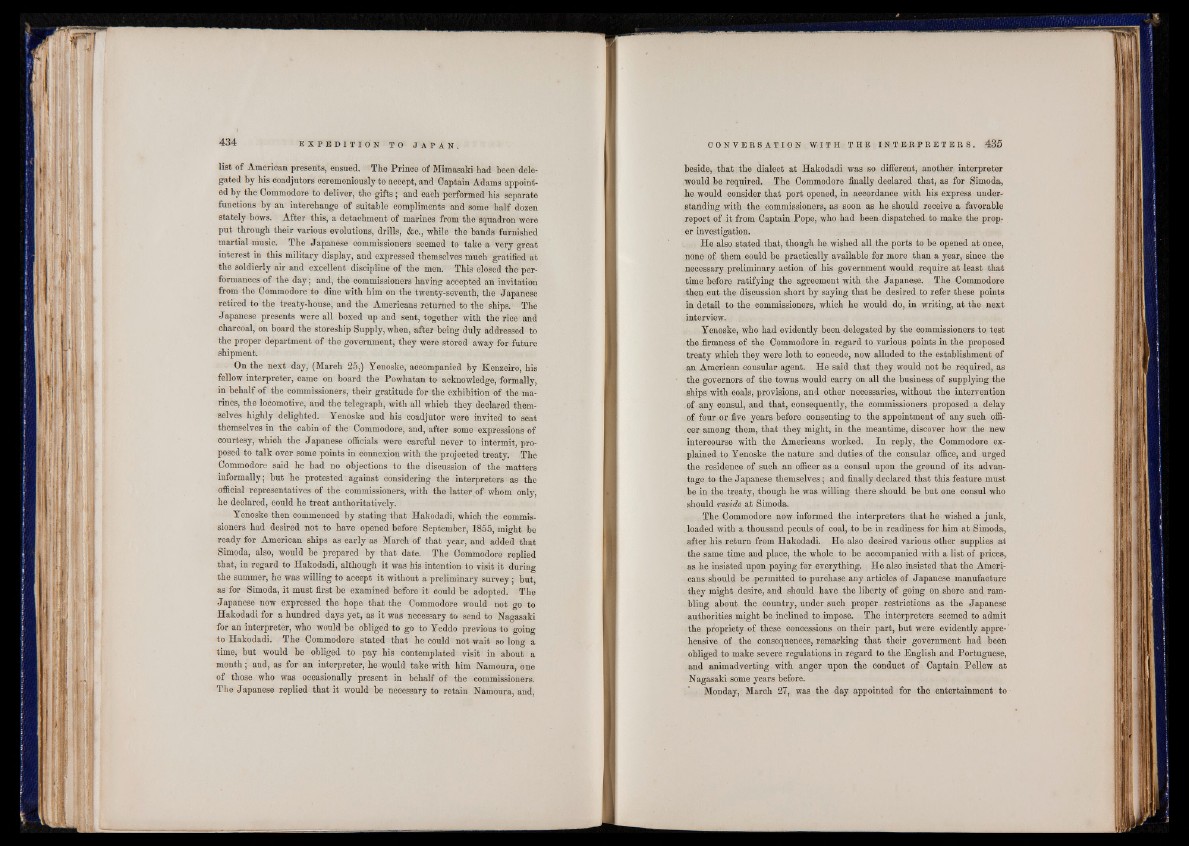
list of American presents, ensued. The Prince of Mimasaki had been delegated
by his coadjutors ceremoniously to accept, and Captain Adams appointed
by the Commodore to deliver, the gifts; and each performed his separate
functions by an interchange of suitable compliments and some half dozen
stately bows. After this, a detachment of marines from the squadron were
put through their various evolutions, drills, &o., while the bands furnished
martial music. The Japanese commissioners seemed to take a very great
interest in this military display, and expressed themselves much gratified at
the soldierly air and excellent discipline of the men. This closed the performances
of the day; and, the commissioners having accepted an invitation
from the Commodore to dine with him on the twenty-seventh, the Japanese
retired to the treaty-house, and the Americans returned to the ships. The
Japanese presents were all boxed up and sent, together with the rice and
charcoal, on board the storeship Supply, when, after being duly addressed to
the proper department of the government, they were stored away for future
shipment.
On the next day, (March 25,) Yenoske, accompanied by Kenzeiro, his
fellow interpreter, came on board the Powhatan to acknowledge, formally,
in behalf of the commissioners, their gratitude for the exhibition of the marines,
the locomotive, and the telegraph, with all which they declared themselves
highly delighted. Yenoske and his coadjutor were invited to seat
themselves in the cabin of the Commodore, and, after some expressions of
courtesy, which the Japanese officials were careful never to intermit, proposed
to talk over some points in connexion with the projected treaty. The
Commodore said he had no objections to the discussion of the matters
informally; but he protested against considering the interpreters as the
official representatives of the commissioners, with the latter of whom only,
he declared, could he treat authoritatively.
Yenoske then commenced by stating that Hakodadi, which the commissioners
had desired not to have opened before September, 1855, might be
ready for American ships as early as March of that year, and added that
Simoda, also, would be prepared by that date. The Commodore replied
that, in regard to Hakodadi, although it was his intention to visit it during
the summer, he was willing to accept it without a preliminary survey; but,
as for Simoda, it must first be examined before it could be adopted. The
Japanese now expressed the hope that the Commodore would not go to
Hakodadi for a hundred days yet, as it was necessary to send to Nagasaki
for an interpreter, who would be obliged to go to Yeddo previous to going
to Hakodadi. The Commodore stated that he could not wait so long a
time, but would be obliged to pay his contemplated visit in about a
month; and, as for an interpreter, he would take with him Namoura, one
of those who was occasionally present in behalf of the commissioners.
The Japanese replied that it would be necessary to retain Namoura, and,
beside, that the dialect at Hakodadi was so different, another interpreter
would be required. The Commodore finally declared that, as for Simoda,
he would consider that port opened, in accordance with his express understanding
with the commissioners, as soon as he should receive a favorable
report of it from Captain Pope, who had been dispatched to make the proper
investigation.
He also stated that, though he wished all the ports to bo opened at once,
none of them could be practically available for more than a year, since the
necessary preliminary action of his government would require at least that
time before ratifying the agreement with the Japanese. The Commodore
then cut the discussion short by saying that he desired to refer these points
in detail to the commissioners, which he would do, in writing, at the next
interview.
Yenoske, who had evidently been delegated by the commissioners to test
the firmness of the Commodore in regard to various points in the proposed
treaty which they were loth to concede, now alluded to the establishment of
an American consular agent. He said that they would not be required, as
the governors of the towns would carry on all the business of supplying the
ships with coals, provisions, and other necessaries, without the intervention
of any consul, and that, consequently, the commissioners proposed a delay
of four or five years before consenting to the appointment of any such officer
among them, that they might, in the meantime, discover how the new
intercourse with the Americans worked. In reply, the Commodore explained
to Yenoske the nature and duties of the consular office, and urged
the residence of such an officer as a consul upon the ground of its advantage
to the Japanese themselves; and finally declared that this feature must
be in the treaty, though he was willing there should be but one consul who
should reside at Simoda.
The Commodore now informed the interpreters that he wished a junk,
loaded with a thousand peculs of coal, to be in readiness for him at Simoda,
after his return from Hakodadi. He also desired various other supplies at
the same time and place, the whole to be accompanied with a list of prices,
as he insisted upon paying for everything. He also insisted that the Americans
should be permitted to purchase any articles of Japanese manufacture
they might desire, and should have the liberty of going on shore and ram-
bling about the country, under such proper restrictions as the J apanese
authorities might be inclined to impose. The interpreters seemed to admit
the propriety of these concessions on their part, but were evidently appre-’
hensive of the consequences, remarking that their government had been
obliged to make severe regulations in regard to the English and Portuguese,
and animadverting with anger upon the conduct of Captain Pellew at
Nagasaki some years before.
Monday, March 27, was the day appointed for the entertainment to